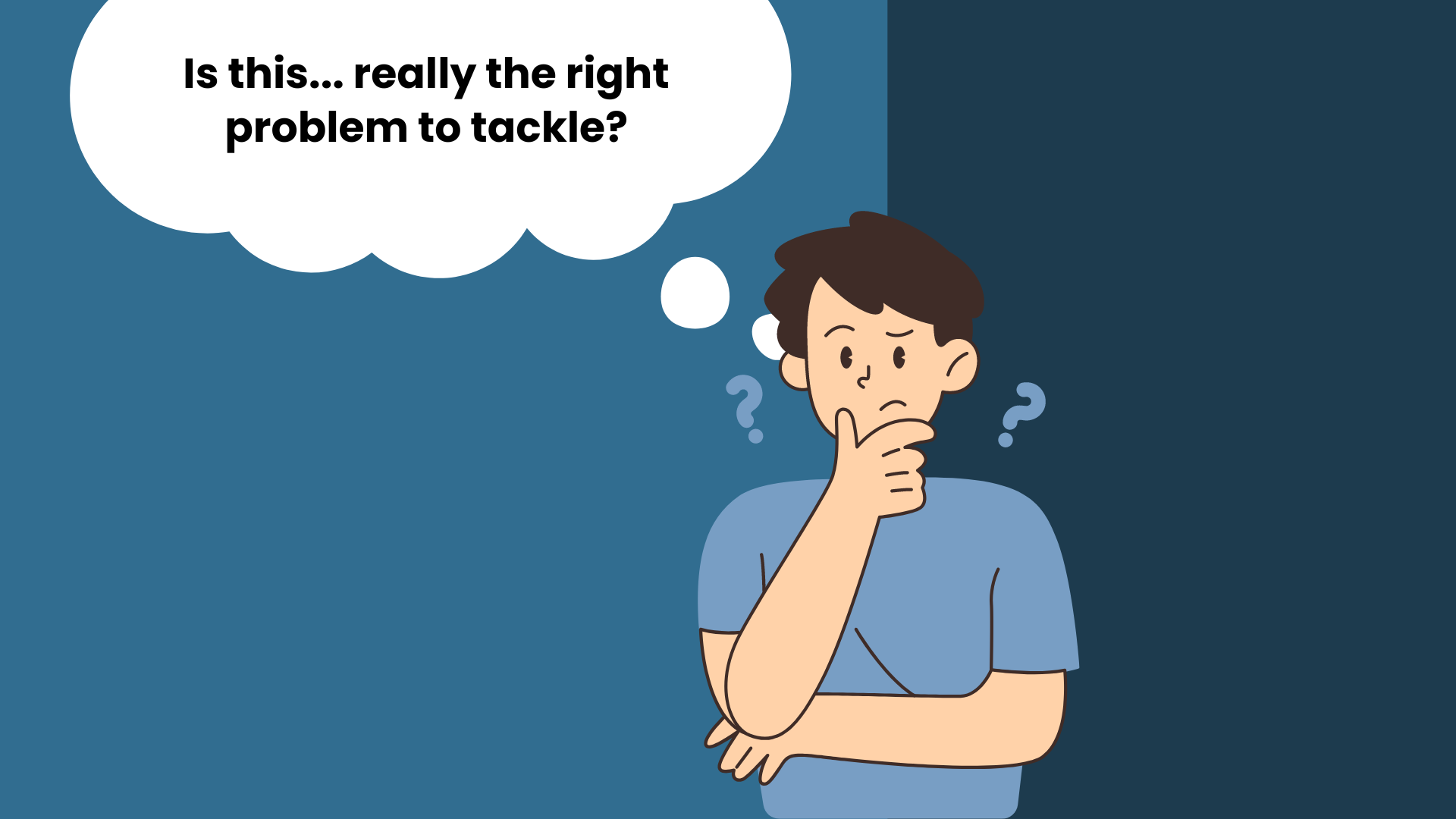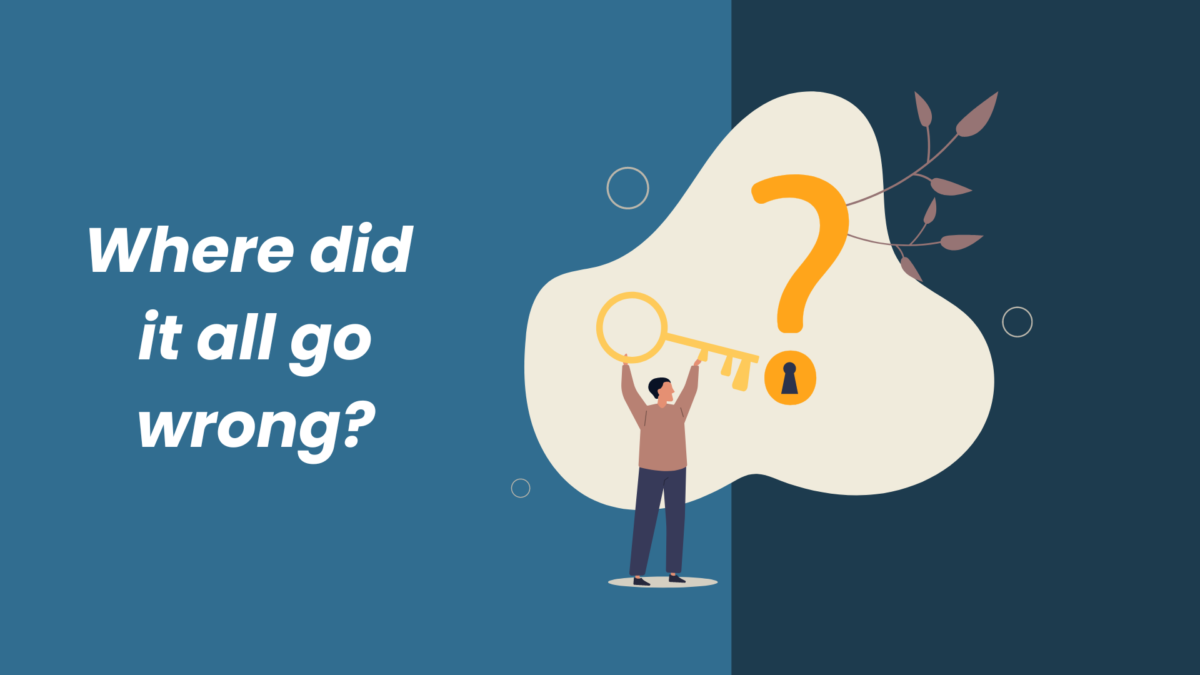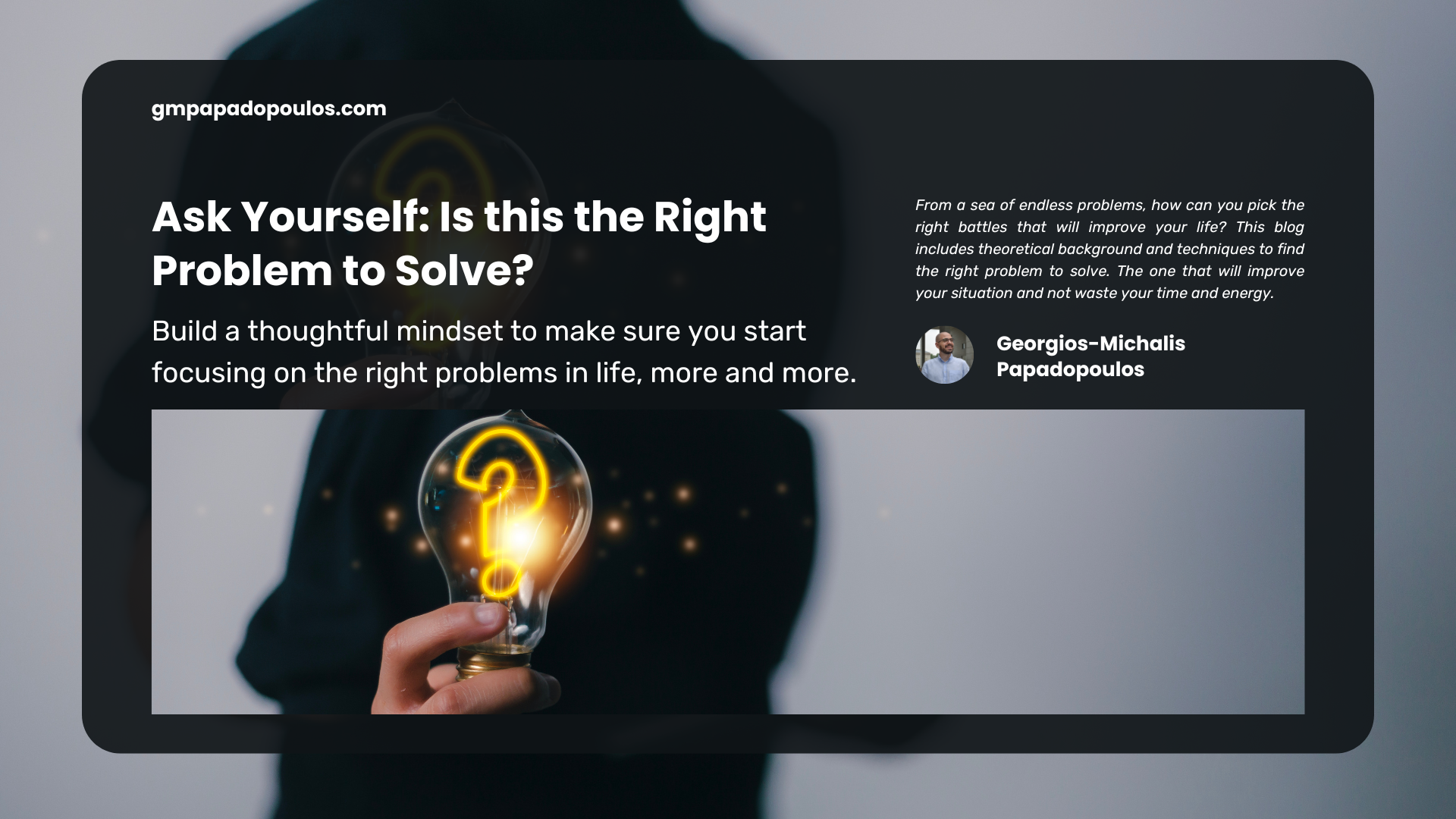Welcome! Seeking answers to the article’s contents, you are? In this realm, we don’t clickbait people. You are here, because you:
- Wish to start understanding which problems will bring more value once solved.
- Suffer from bad time management, prioritization, and poor personal & professional results.
- Understand that this article has personality, and doesn’t offer direct answers – but creates the right questions for you to solve.
No matter your situation, I am certain you’re facing some issues.
And, in an endless sea of problems, navigating its currents can seem impossible.
What usually happens, is that you lose yourself in the process, and focus on all the wrong destinations.
Our world seeks capable problem solvers, as it values answers. We live in an answer-driven society, after all.
Yet, maybe it’s time to start valuing another skill more and more – Problem finding.
How to evaluate your situation, define your goals, achieve them, reduce the noise of the infinite bottlenecks and barriers, and pick the right battles.
Where to begin, you ask? It’s a question I’ve asked myself plenty of times. But in 2024, I decided to change that.
I have been educating myself a lot on soft skill development this year. Think of it as my New Year’s Resolution that has not tanked yet.
Communications, growth mindset, resilience, self-awareness, coaching techniques, you name it. As of the end of March, I invested more than 75 hours in life-changing courses. Go have a look at my LinkedIn profile for the full list if you don’t believe me.
And, writing about this topics, the way I see it, is a win-win for all.
- To benefit you, the reader, from my learnings.
- To also benefit myself in accumulating all these ideas in a way I can comprehend.
I’ve started some days before, with my 9 best tips on negotiations. Go check that out if you haven’t yet.
And I am planning to continue, after I fully recover from coming back to Greece, after two years of living abroad. So, expect many, many more articles on personal & career development looking forward.
However, there is no better way to begin by focusing on problems. Finding the right problem.
Do stick with me since this is relevant to your professional and personal life. We most probably have problems in both, haven’t we?
Table of Contents
The pitfalls of focusing on the wrong problem
Can you assume you’re focusing on the key problem from the get-go? Not necessarily.
Actually, avoid making this assumption for crucial issues altogether.
Take a breather now. And think: was there a time that your problem-focus wasn’t ideal?
Well, it could have happened for various reasons. Maybe you are:
- Not focusing on the right problem.
- Concentrating on a single solution.
- Narrowing yourself down to one option.
- Misunderstand the context of your problems.
- Experiencing strong personal bias.
Now, do not feel bad about it! You can discover an endless stream of problems if you try to – so it’s difficult to pinpoint the one that solves most of your issues.
Why care to find the right problem?
Imagine going through all the pain and suffering, spending so much energy and resources, and solving a problem that does not assist you the way you hoped for.
Let me demonstrate with an example, applicable for the entirety of this blog post.
This blog’s case study – Myself
After some time in one of my roles working for a corporation, I felt it was time for a change.
Leadership has changed. Goals have changed. The person who hired me in this role was laid off a month ago.
My first thought was to protect my role. All the projects I worked hard for, my strategic ideas, everything in between. But it quickly became apparent that things had changed. My new manager did not trust me for the big-scale projects I was handling before. And, they had their reasons – in retrospect, they might have been right.
So, I decided to pursue a new role.
Setting my problem, as that I was in need of something new.
Placing myself inside the wrong train of thought. Without even being aware of it.

Leading me to the next section.
The concept and necessity of focusing on the key problem
Have you ever watched Lord of the Rings?
Hopefully, you have profoundly answered, “Yes, of course!”.
If not, your key problem is that you have not watched Lord of the Rings (joking, of course, I understand it is not for everyone).
Either way, picture the start of the movie. Or watch it in the clip below:
The elves had three rings. Seven were given to the dwarves. And nine to the men, who only craved power.
But all of them were fooled, thinking they had been blessed with power. Everything between the races was in balance.
None of them thought that they were deceived. From the creation of the one ring. One ring to rule them all.
One problem to rule them all.
It is an easy, but necessary concept to remember when getting into problem-solving mode.
In principle, just because you have a problem does not mean that this is the issue that you should be working on.
- Have you given enough thought to the root causes of your problem?
- Are you confident that the problem you focus on covers everything you have been struggling with?
- Have you challenged & questioned yourself to prove if the problem you are thinking of is the one?
In a more business-oriented concept, are you sure you are not trying to cover a near-term problem, completely ignoring the underlying, long-term causes? This Harvard Business Review article from 2012 covers such a case very thoroughly.
Let’s see it from a personal example that merges the personal and professional realms, continuing from the previous section.
Thinking of job search as poorly as possible
I had to look out for a new job.
But not all jobs are created equally.
Of course, I knew that. I was still looking for something specific.
I had even set some criteria for myself to look for
- A value-driven, fair company with a strong brand and products that still provide some flexibility to their employees.
- A humane manager who understands their people and promotes a work-life balance.
- A remote or based in the same country as I was a vacancy, wishing to remain here and give it a second chance.
- A team located in the same city as me, at least for the most part, especially if the role was to be hybrid.
- And, of course, something that paid better than my last role and can be seen as an improvement from my last one.
My variables were set, and it was time to find a new role. A long, extensive search followed suit. Finally, I got one. It paid much better than previously. Coming with a rank upgrade too! My manager, whom I met in the interview stage, was fantastic. The company was rated highly on Glassdoor. Soon enough, I passed all the stages and accepted the enticing offer.
And it still proved to be a wrong choice.
Two months into the new chapter, my role suddenly changed because of a restructuring. They moved me into a new team that was new to the organization, with a new manager. None of my then-new colleagues were in the same office as me after that.
My manager and I had different work cultures & values. And it became clear that I wasn’t a match.
One thing led to another, and I realized there was no future for me within the organization. So, I had to quit.
It was harsh. I felt I was back to zero – and I was.
Left myself thinking about what I did wrong.

Where did it all go wrong?
How can I know I am finding the right problem?
One of the inspirations and sources for this blog was the Analyzing Complex Problems course I have done through ExecOnline, led by IMD’s Arnaud Chevallier & Albrecht Enders. I truly recommend it if you can access the platform from your organization.
A problem exists because everything else around it is as it is. And it has some main parts you need to look for.
- Goal or Need: What are the things you are actually trying to accomplish? Are there any deeper needs you need to address instead? How can you be sure?
- Situation: What is your current environment (people, resources, time, abilities, etc.)? Think of all the necessary elements that synthesize the picture.
- Complication: What is missing from your situation to accomplish your goal? What are the barriers, distractions, and limitations you need to address?
From the combination of all three, here comes your key question:
How can I reach *goal* in *situation* given *limitations*?
A simple yet powerful way of looking at a problem. However, you can still implement the methodology wrong if you are not careful: overanalyzing, not being clear, thinking of overlapping information, and being subjected to your own blinding bias.
How can this methodology still go south?
Coming back to my example, I reached a question as follows:
How can I find a new job, as in the current situation, I do not have any space to grow anymore, am not fully utilized, and the work environment doesn’t match my character, given the current job market, my previous experience, and my limitations set above?
Can you see any problems already?
- I just assumed that my problem was that I needed to find a new job. I never searched any deeper than that and never challenged my original thought.
- I did not evaluate my situation so well. I was stressed because it was the first time I was sidelined, and I began building internal pressure to jump ship as soon as possible.
- The whole thing led to a significant burnout in the end. In retrospect, looking only at myself and what I did wrong back then, I could have waited it out – the firm did not want to fire me yet. If I had been able to swallow my pride, I would have been able to last a bit longer to find the right thing to do.
- I did not analyze my constraints thoroughly. There were overarching problems I failed to take into account. My search was broader than it should have been. Desperation led to bias on what I could accept. Bias led to a wrong decision.
What are the ways to find which is the actual problem I should be solving?
This one is tricky to cover in one article. Honestly, there is no answer here. No panacea, flexing my Greek heritage once more.
I will skip any fancy methods and models. Instead, I will suggest one passed to me.
Panos, an old colleague and a great friend, advised I do something a bit absurd-looking, but wildly effective to my case. I doubt he invented this himself, but it was golden advice.
“You think you have one problem, but you have much more” he mentioned a bit causticly. But he didn’t mean harm with the suggestion.
That was his solution:
- List down all of your life problems. Go as deep as you can. What is happening with your relationships? Your hobbies? Your life goals? Your health? Money? All aspects. The ones you deem as important.
- Start evaluating. Which of these are vital to you? Which are urgent?
- Prioritize the ones that will bring the most value.
- And challenge yourself to see if you are always making the right choices. Actually, challenge the ones you deem as most obvious at first the hardest, with all the evidence you can find to counter them, beating up any bias in the process.
- Then connect everything, describing your situation, limitations, and goals, since you have now taken into account all of the ones that matter.
Life is a puzzle that we forget to consider as a whole. He has known me for years and called me out to think this one time holistically about myself.
But all these apply to your professional life:
- How many times can you think of management trying to implement a solution, thinking of the problem too narrowly?
- How often can you see yourself doing that?
- How did you overlook the current situation?
- How did you fail to account for any limitations?
- How did you under or overvalue any of the problems you have?
An example, relevant to the times; is a company might have an issue with parking spots. Does this mean they will fire half of the personnel to free up space?
If it was a major tech corporation, most probably yes. They would not bat an eye over the thousands of lives affected.
But of course, it’s not the right thing to do.
The issues might seem simple enough, but they are not. For complex professional issues, you cannot afford not to look at the issues thoroughly.
How would the case study be reshaped?
If I had done that in the past, I would have seen the real issues. The deeper causes.
- A non-flexible, strict corporation environment does not suit who I am.
- My location actively brings me suffering in my physical health, so locking myself down in one place is something I cannot afford.
- A job that does not help people and output actual, productive results does not fulfill me.
- Honestly, I do not even care about money that much! The only time I am overspending is to travel. A good contract is appreciated, but there is far more in life than money.
Knowing all these would have shaped my key question much more differently. It was never about that job in particular. It is about what I need as a person.
How can I find and pursue a career as in the current situation, I am not feeling fulfilled mentally and am in pain physically, given the current job market, my previous experience, and my limitations set above, plus my need for a remote role on a noncorporate, environment, that prioritizes results and has a human approach to their employees?
This is so, so much different. Isn’t it?

While it is a more difficult-to-solve issue, it motivates me – because I know it is true! I have analyzed everything thoroughly and came down to this. And I can start working on better ways to break down and solve it.
Wrapping up
You know your situation better than me. So you can follow these principles to build your methods.
“But, wait!” I hear you say.
Now that I have the problem, how can I solve it?
If you can’t wait, Google it. If you’re a Gen Z or younger, TikTok it. Or ask ChatGPT, Google Gemini, or any other generative AI-hyped platform.
Or, give me some time. I will come back with a second blog post on this exact topic. Stay tuned!
As I mentioned in the beginning, I have invested lots of hours into life & professional coaching courses in the last few months.
And I am happy to announce that, apart from all my other certifications, in March 2024, I received my first life coaching certification from Udemy & Transformation Academy!
I want to focus my offer on enabling others to navigate change – both personally and professionally. Because my own life span has been enriched with unexpected twists and turns, from career swifts to moving to new cities, to experiencing changing environments, to departing with friends, family, and partners.
From life, from others, and from courses, I have now started to grasp how to handle changes. And I want to be this person to people struggling with transitions. Coach others in enabling them to advance their situation.
I am slowly gathering the courage and knowledge to come out to the world and display my services. I believe I’ll be fully ready by September.
But, if you see these lines, and you
- Are facing changes in your life that you are having difficulties adapting to (ex. breakup, moving to a new city),
- Need to change something in your life (such as breaking an old habit or exploring new passions), or
- Feel stuck with how your life has been lately and want to discover ways to get moving once more.
Then send me a message on LinkedIn or through email and discuss.
Or, click the button below. That works too.
We can find a way to get you through this, stronger and better than before.
Nevertheless, good luck with what problems you are going through. You can solve them – but remember to focus on the right ones!

Comments are closed.